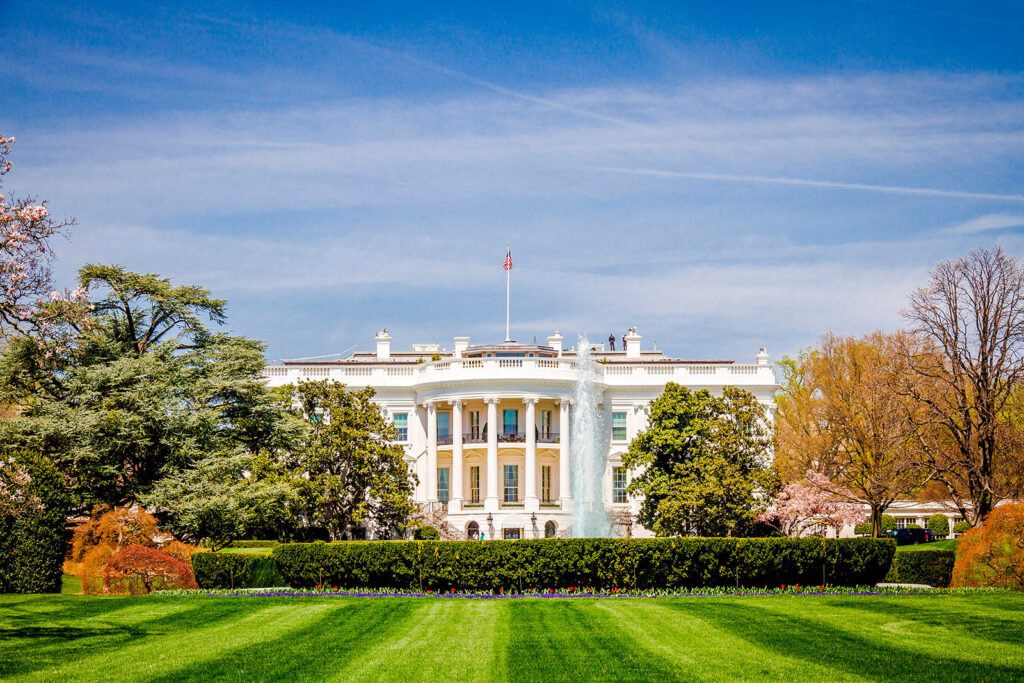White House insists fundamentals of U.S. economy ‘very strong’

The “fundamentals” of the U.S. economy are solid, the White House asserted, invoking an ill-fated political declaration of a decade ago amid mounting concern that a recession could imperil President Donald Trump’s reelection. Exhibiting no such concern, senior adviser Kellyanne Conway declared to reporters on Monday, “The fact is, the fundamentals of our economy are very strong.” It’s a phrase with a history. Republican John McCain was accused of being out of touch when he made a similar declaration during the 2008 presidential campaign just hours before investment bank Lehman Brothers filed for bankruptcy, setting off a stock market crash and global financial decline. A case can be made for the White House position. The U.S. job market is setting records for low unemployment, and the economy has continued uninterrupted growth since Trump took office. But growth is slowing, stock markets have swung wildly in recent weeks on recession fears, and indicators in the housing and manufacturing sectors have given economists pause. A new survey Monday showed a big majority of economists expecting a downturn to hit by 2021 at the latest, according to a report from the National Association of Business Economics. Trump begs to disagree. “We’re doing tremendously well. Our consumers are rich. I gave a tremendous tax cut and they’re loaded up with money,” Trump said on Sunday. “I don’t think we’re having a recession.” Still, the Republican president took to Twitter on Monday to urge the Federal Reserve to stimulate the economy by cutting interest rates and returning to “quantitative easing” of its monetary policy, an indication of deep anxiety beneath his administration’s bravado. And he backtracked last week on taking the next step in escalating in his trade war with China, concerned that new tariffs on consumer goods could hamper the critical holiday shopping season. White House aides and campaign advisers have been monitoring the recent turbulence in the financial markets and troubling indicators at home and around the world with concern for Trump’s 2020 chances. Any administration has to walk a fine line between reflecting the realities of the global financial situation and adopting its historical role as a cheerleader for the American economy. For Trump, striking that balance may be even more difficult than for most. For decades, economic performance has proven to be a critical component of presidential job approval, and no American leader so much as Trump has tied his political fortunes to it. The celebrity businessman was elected in 2016 promising to reduce unemployment — a task at which he has succeeded — and to bring about historic GDP growth, where he has had less success. The situation today isn’t nearly as dire as in September 2008, when the U.S. and the world were heading into the Great Recession. There are no waves of home foreclosures, no spike in layoffs, no market meltdowns and no government rescues to save powerful banks and financial companies in order to contain the damage. What does exist is a heightened sense of risk about the economy’s path amid slowing global growth and the volatility caused by the trade dispute between the United States and China. There are other reasons as well for the administration’s rosy pronouncements, said Tony Fratto, a former Treasury Department spokesman in the Bush administration during the onset of the financial crisis. He said he sympathized with the Trump administration for having to choose between answering “honestly or responsibly” or otherwise about the state of the economy, noting that any hint of concern “could be self-fulfilling.” “So much of the story of the economy is how people feel about it,” said Lanhee Chen, a Hoover Institution fellow and former economic adviser to 2012 GOP nominee Mitt Romney. “And that’s an inherently a difficult thing to measure.” Highlighting a disconnect between the nation’s broad economic indicators and the “personal economies” of voters in swing states is a priority for Democratic candidates and outside groups heading into 2020. Trump’s advisers acknowledge there are few tools at his disposal to avert a slowdown or recession if one materializes: Internal concerns over a ballooning federal deficit, in part due to the president’s 2017 tax law, are stifling talk of stimulus spending, and skepticism abounds over the chances of passing anything through a polarized Congress ahead of the election. But that hasn’t stopped the White House from exploring ways to make the political cost less painful. Seeking to get ahead of a potential slowdown, Trump has been casting blame on the Federal Reserve, China and now Democrats, claiming political foes are “trying to ‘will’ the Economy to be bad for purposes of the 2020 Election.” If the Federal Reserve would reduce rates and loosen its grip on the money supply “over a fairly short period of time,” he tweeted, “our Economy would be even better, and the World Economy would be greatly and quickly enhanced – good for everyone!” Those actions he’s talking about are the sort a central bank would traditionally take to deal with or try to stave off a slowdown or full-blown recession. Strong fundamentals? A lot depends on which ones the administration highlights or ignores in public comments. Conway and other Trump aides have accurately described the rising retail sales and the solid labor market with its 3.7 percent unemployment rate as sources of strength. Yet factory output and home sales are declining, while business investment has been restricted because of uncertainties from Trump ratcheting up the China trade tension. Even if the economy avoids a recession, economists still expect growth to weaken.Federal Reserve officials estimate that the gross domestic product will slow to roughly 2 percent this year, down from 2.5 percent last year. During his presidential campaign, Trump had boasted he would achieve long-term growth of 4 percent, 5 percent or more. By Zeke Miller and Josh Boak Associated Press AP Business Writer Marcy Gordon contributed. Republished with the permission of the Associated Press.
New marriage forms and process starts week

Alabama will require new forms— and a new process — for getting married beginning next week. The Alabama Department of Public Health issued guidance Tuesday about the new form and procedure. The Alabama Legislature this year voted to do away with marriage licenses to accommodate conservative probate judges who objected to same-sex marriage. Instead of a marriage license, couples will fill out a new form , have it notarized and then take it to the probate judge within 30 days. A wedding ceremony is no longer required, but a couple can still have one if they choose. The couple’s marriage date is the date that the affidavit on the Alabama Marriage Certificate form is signed by the two spouses, provided the notarized form is returned to the probate office within the required time frame. The change begins Friday, August, 29th. Ever since same-sex marriage became legal in Alabama, a few of the state’s 68 probate judges had refused to issue marriage licenses to anyone so they didn’t have to give them to gay couples. Alabama law says probate judges “may” issue marriage, but doesn’t force them to do so. Republican Sen. Greg Albritton proposed the change in state law. He said he believes it should accommodate probate judges’ concerns and allow people to get marriage documents everywhere. “There are many areas that are not conducting any marriages at all in the state. That puts a burden on those residents to travel somewhere else,” Albritton said. “I think it is going to allow all of Alabama to engage in matrimony. I think that is a very good thing,” Albritton said. Albritton pushed the change for several years before it was approved this legislative session. When the Alabama House of Representatives approved the change in May, Rep. Neil Rafferty, the only openly gay member of the House, said the change was “born out of prejudice.” “It accommodates a handful of judges that couldn’t get their personal feelings, couldn’t check those at the door and couldn’t do their jobs,” Rafferty, Democrat-Birmingham, told reporters in May. Republished with the permission of the Associated Press.
John H. Merrill: Doing more with less

Just last week, Forbes reported that President Donald Trump has reduced his payroll and saved American taxpayers more than $20 million. He reduced staff, eliminated excess spending, and still, government continued to operate more successfully than it has in years. While his predecessor spent 8 years filling the Executive Branch with political employees, friends and cronies, President Trump is actively reducing his office budget and returning money to the taxpayers. Here in Alabama, I have followed that same philosophy. Reducing overhead and staffing costs and increasing efficiency. Since January 19, 2015, the Office of Alabama’s Secretary of State has set new standards for excellence in efficiency and cost savings in state government. In total, we have saved more than $2.8 million dollars for Alabama taxpayers by reducing staff and increasing efficiencies, just as President Trump has done at the federal level. We reduced our office staff from 49 employees to its current staff of 36 employees. We reduced the wait time for business filings. When we arrived, those filings could take from seven to nine months to complete. For the last three years, we were able to condense that time to same-day processing. We have also introduced automatic business filings that are available to every county, which our office pays for at no expense to the county of origin. We no longer receive a general fund appropriation from the Legislature because in 2016 we asked them to zero our office out of the general fund budget making us fully self-sufficient without using general fund tax dollars. We no longer operate at the speed of government, we operate at the speed of business! We have done all this with less money and less people. Simply put, we’ve done more with less and have made it easier and quicker for new business to form in our state. It can be done and it should be done throughout all sectors of our State and Federal government. The swamp in DC is full of wasteful spending that is propagated by endless debt hike politicians. Government should not be in the business of creating GOVERNMENT jobs. They should be in the business of creating an environment where the free market creates private sector jobs. It’s not enough for government to operate like a business, we also must force it to operate at the speed of business and that means doing more with less, so taxpayers have more, not less. We’ve done exactly that in the Alabama Secretary of State’s office and we encourage all sectors of our government to do what we have done and what President Trump has done. Cut waste and do more for the taxpayers without spending so much taxpayer money. John H. Merrill currently serves as Alabama’s Secretary of State. He was elected in 2014 and reelected in 2018. He is currently seeking the Republican nomination for the United States Senate.
Jim Ziegler is right – if everyone uses their time & voice wisely you can win

People are angry! People are fed up! They’re disgusted with the excuses and the rhetoric and annoyed with the elected officials who are on the fence or are worse supporting the toll because they don’t have any other ideas (more on that another time). The plan for the tolls in Mobile County is unfair to every family and small business down there. No matter how they swing it the cost is just too high. Jim Ziegler has been the biggest leader in rallying the troops to defeat the toll and he’s recently scored some big supporters who have joined the cause but that’s not enough. I am a frequent speaker to social, community and political groups on how to use their voice to influence public policy and the key to being an effective advocate for your position is to use your time and resources correctly. If you are not in Baldwin County, do not fear you can help too! Get the word out to those you know in the county. Show up to support them, there’s strength in numbers, rally around the cause. This week that would mean everyone directing their attention and actions to the upcoming meeting here’s what Ziegler has posted about the meeting and where you can find more information: Voters of Mobile County: Your Input Needed Quickly in Transportation Improvement Program (only for our members in Mobile County. A similar program for Baldwin County will be posted here next week. Watch for it, Baldwin County). A long-range transportation plan is being considered and possibly adopted this Wed. Aug 21. Your help is needed to ask the board to remove the I-10 toll plan so that other available funding can be used.You can help by one or both of two ways. 1. Write and send your written comments against the toll plan and ask that it be removed in favor of other funding. Mail or e-mail your form so it will be received by the deadline of noon Tuesday, Aug 20. Your comment form is here: https://www.mobilempo.org/Public%20Notices/COMMENT%20TIP%202019.pdf?fbclid=IwAR121T8N8UlAhRuoDeZ54DQlYV6v5x4SkFZ_MjaNHoCjJ8JBL9aQKj21wnc The mailing address is: Transportation Coordinator, South Alabama Regional Planning Commission, PO Box 1665, Mobile AL 36633. The e-mail address is kharrison@sarpc.org 2. Show up and give a short comment in person at the meeting. It is this Wed. Aug 21 at 10 a.m. at the SARPC board room on the First Floor of the GMO Building, 110 Beauregard Street, Mobile, AL. Please bring a copy of your written comment with you.Details about this process are at: https://www.mobilempo.org/Documents/Planning/July29Draft%20Mobile%20MPO%20FY2020%20-%20FY2023%20TIP_%20(003).pdf?fbclid=IwAR29VFRnxIB9I8HJn-GENz705OXXd4UaP3VjVrU5Iipy2qzrzySqJaOe2Ko(Baldwin County, look for your information on your TIP meeting next week on this FB group). 3. Voters in different cities in Mobile County. Here are your members on the transportation board. Please contact yours (and ONLY yours) quickly. Ask them as a member of the transportation board to stand strongly against including the toll plan (Project ID 5011) in the program. Encourage them not to buy into the ALDOT argument that we have to have the toll. Mayor, City of Mobile – Hon. Sandy Stimpson (Chairman) 251-208-7395 mayorstimpson@cityofmobile.org Mobile County Commissioner – Hon. Jerry Carl, 251-574-3000, district3web@mobile-county.net Mobile County Engineer – Mr. Bryan Kegley, 251-574-8595, info@mobilecounty.net Councilman, City of Mobile – Hon. John Williams, 251-208-7441, council4@cityofmobile.org Councilman, City of Mobile – Hon. Fred Richardson, 251-208-7441, council1@cityofmobile.org Mayor, City of Prichard – Hon. Jimmie Gardner, 251-452-7800, info@thecityofprichard.org Councilman, City of Prichard – Hon. Lorenzo Martin, 251-452-7801, l.martin@cityofprichard.org Mayor, City of Chickasaw – Hon. Byron Pittman, 251-452-6450 Mayor, City of Saraland – Hon. Howard Rubenstein, 251-375-5333, hrubenstein@saraland.org Mayor, City of Satsuma – Hon. Thomas Williams, 251-487-0112, twilliams@cityofsatsuma.com Mayor, Town of Creola – Hon. William Criswell, 251-675-8142, info@cityofcreola.org Mayor, City of Bayou La Batre – Hon. Terry Downey, 251-824-2171 Mayor, City of Semmes – Hon. David Baker, 251-649-8811, information@cityofsemmesal.gov


